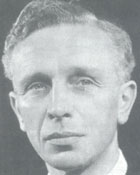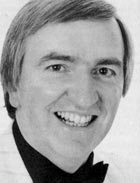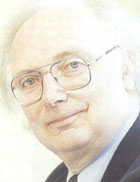|
2003 Pontins Brass Band Championships
Pontins Holiday Camp, Prestatyn, North Wales
Sat/Sun 25/26th October
Test Piece Reviews
We cast our eyes over the fine choices made for the 30th
Championships this year.
 Festival
Music – Eric Ball Festival
Music – Eric Ball
Festival Music was written by Eric Ball as the set work for the
1956 National Championships of Great Britain, which was won on the
day by the Fairey Aviation Works Band conducted by Major George
Willcocks. It is perhaps the only major test piece that the composer
wrote as a pastiche, as its influence is indubitably that of Mozart,
who tercentenary of his birth was celebrated that year.
However, “Festival Music” is not a descriptive piece,
and although there are three titled movements – “Overture”,
“Romance” and “Impromptu” each stand alone
as masterful compositional miniatures rather than interlocking developing
sections. It is though a truly superb brass band work – exacting
in technique (even 46 years after its premiere) and musically crafted
with impeccable taste and thought. Nothing is overdone, overstated
or used as an excuse to make unreasonable demands on the performer.
Eric Ball has given the competing bands and their Musical Directors
the ideal opportunity to understand and enjoy Mozartian music written
for brass.
The “Overture” in C minor is cast in an abridged classical
mould of exposition, development, recapitulation, coda – although
there is no introduction, and the technical demands on the lower
brass are the equal of the florid cornets throughout. Like the young
Wolfgang Amadeus himself, it is brilliantly precocious, full of
verve and immensely stylish.
“Romance” is operatic in character, comprising three
main themes. The first is heard on the euphonium, horn and baritone,
whilst the second employs the three trombones and 3rd cornet! Finally,
the flugel and horn take the third, before an almost duo –
cadenza for euphonium and cornet leads to a reprise of the first
theme and a brief subtle close.
Finally a freely planned “Impromptu” which undulates
in a G sharp minor key before developing with a facile tune of lightness
and freedom. There is no reprise of previous material though until
the very end when the very first theme appears again. Eric Ball
though ensures that just like Mozart, his ending is as mysterious
as that of the composers life – a beguiling whisper of a trill
before a thunderous last climatic chord.
Nearly half a century after it was first used it is a test piece
that will test the bands to the full, whilst leave the audience
with a satisfying musical listening experience.
 Resurgam
– Eric Ball Resurgam
– Eric Ball
“Resurgam” is perhaps the most well loved original
brass band composition ever. Written by the composer, and reputed
to be his own favourite, for the British Open Championships of 1950,
it takes its inspiration form the apocryphal Book of Wisdom (III:
1- 3) 2The souls of the righteous are in the hand of God, and no
torment shall touch them….” It is dedicated to his sister
in law, Elsa who died prematurely of tuberculosis in 1942. The winners
of the Open that day were Fairey Aviation, conducted by Harry Mortimer,
who was perhaps the greatest interpretator of Eric Ball’s
music.
The musical character of the work explores the composers understanding
of his faith – through times of darkness, sorrow, doubt and
despair. There is also anger and conflict, which is underpinned
by the bass section of the band invoking the ancient “Dies
Irae” (Day of Wrath) chant and the sound of “Death”
itself knocking on the spiritual doors of the disturbed souls. Finally
the composers faith in his God wins through in the glorious climax
of the piece, which symbolises resurrection – a moment of
brass writing perhaps never bettered since.
“Resurgam” remains Eric Ball’s greatest achievement
– a piece that transcends the meaning of a prescribed work
of music written just as a “test”. It is, and will always
remain, music of the soul.
 Oceans
– Goff Richards Oceans
– Goff Richards
“Oceans” was written by Goff Richards as a commission
from the West of England Bandsmen’s Festival for the 60th
Anniversary Festival of the famous Bugle Contest, in Cornwall in
1984. It has been used as a set work at Championship, First and
Second Section levels and was the Second Section set work for the
Regional Championships of Great Britain in 1993.
It is a wonderfully descriptive piece that takes its inspiration
from the sea – the Atlantic Ocean - a force of nature that
nowhere in Cornwall is far from. It opens with majestic fanfares,
which then gives way to a lovely broad and sensual theme first played
on the euphoniums. After quieter solo sections the atmosphere builds
slowly to a climax – as if the ocean itself is crashing against
the seawalls of those beautiful picture postcard villages dotted
along the West Coast of the county.
The Ocean though is also an exciting place, and a means of exploration
to new lands, and we hear the sounds of the Caribbean in technicolor
splendour and rhythmic gaiety, which is only interrupted by a return
to the original thematic material. It is as if the Cornish people
had to stop having too much of a great time! The piece though ends
with a blaze of colour.
“Oceans” is typical Goff Richards – vibrant,
exciting, and rhythmic and makes enjoyable technical as well as
musical demands on both players and Musical Directors. He has captured
the essence of the sea as if he had spent his life upon the ocean
wave.
 Suite
- The Seasons – Philip Wilby Suite
- The Seasons – Philip Wilby
Philip Wilby was commissioned to write “The Seasons”
by Ian Thompson in memory of his wife Myra and the Suite depicts
the changing seasons of the year.
The First Movement entitled “Turn of the Leaf: Prelude and
Dedication opens quietly before unfolding with solo interludes and
beautifully subtle colourings of timbre. The tender melodic line
is passed with care between the flugel and euphonium before the
solo cornet enhances it further. There is a brief glorious climax
before, jest as the turning leaf itself, it fades falls to a quiet
deathly whisper.
The Second Movement is entitled “Spring Waltz” and
is a joyous waltz that evokes the beauty of newborn life. The waltz
is led first by the solo horn, before the soprano, solo trombone
and horns again take turns to celebrate. By the time the trombone
and euphonium enter the tempo has increased to an almost uncontrolled
jollity, before the flugel returns things to a more subtle tempo
and the solo horn reprises a close with a swish and seductive musical
twirl.
Finally the Third Movement evokes “High Summer: Marziale
– with strong fanfare like figures, jaunty and vigorous in
character. This is a celebration of the zenith of Summer –
golden fields, bright blue skies, joyful people revelling in the
beauty of nature at its finest and Wilby captures it fully. The
ending itself is almost thunderous, yet triumphant and glorious.
The composer himself noted “My aim was to provide music which
was both enjoyable to rehearse and perform, but not forbiddingly
difficult to play.” He has done this perfectly.
The piece was used as the set work for the Fourth Section National
Finals in 2000, which was won by Beaumaris B Band conducted by William
Evans.
Music from Kantara – Kenneth Downie
Despite the exotic name, the origins of Kenneth Downie’s
fine three-movement work are very much more prosaic. When the composer
and his wife moved into a new home they were intrigued to find it
was named “Kantara”, and being the type of people who
didn’t wish to upset the outgoing owners, or the Post Office
for that matter, decided to keep the name themselves.
With some judicious research Kenneth Downie found out that Kantara
was in fact the name of a ruined castle in Northern Cyprus which
the previous owners had once visited and when they handed over the
keys, left Mr and Mrs Downie with a picture postcard of its location.
Written for a Youth Contest, the piece is in three movements, each
of individual character, but in no way descriptive. Each is formally
constructed yet each retains a quirky individualism that is so enjoyable
about the composers works. It has been used at these Championships
before, in 1996 in the 3rd Section when the contest was won by the
Milnrow Band.
© 4BarsRest
 back to top
back to top
|

